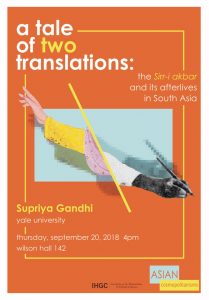 In 1867, the Hindu reformist, Kanhaiya Lal Alakhdhari, completed an Urdu translation of fifty Upanishads. Alakhdhari, who later played a key role in establishing the Arya Samaj in the Punjab, expressed a concern that Hindus, unlike Muslims and Christians, were unfamiliar with their sacred texts. His translation was based on the Sirr-i akbar, an earlier Persian translation produced by the Mughal prince, Dara Shikoh, in 1657. Dara Shikoh argued that the Upanishads constituted a divinely revealed scripture, which held the key to the Quran’s mysteries. How did a seventeenth-century gesture of cross-cultural translation within an Islamic interpretive frame come to inform a sectarian Hindu project in the nineteenth-century? This talk examines these two moments of translation as a lens for exploring issues of scripture and language during the emergence of modern Hinduism.
In 1867, the Hindu reformist, Kanhaiya Lal Alakhdhari, completed an Urdu translation of fifty Upanishads. Alakhdhari, who later played a key role in establishing the Arya Samaj in the Punjab, expressed a concern that Hindus, unlike Muslims and Christians, were unfamiliar with their sacred texts. His translation was based on the Sirr-i akbar, an earlier Persian translation produced by the Mughal prince, Dara Shikoh, in 1657. Dara Shikoh argued that the Upanishads constituted a divinely revealed scripture, which held the key to the Quran’s mysteries. How did a seventeenth-century gesture of cross-cultural translation within an Islamic interpretive frame come to inform a sectarian Hindu project in the nineteenth-century? This talk examines these two moments of translation as a lens for exploring issues of scripture and language during the emergence of modern Hinduism.
Supriya Gandhi works on the interface of Islam and Indic traditions in South Asia. She completed her doctorate at Harvard University, and has also studied in Delhi, Tehran, London and Damascus. She teaches in the department of Religious Studies at Yale University.

